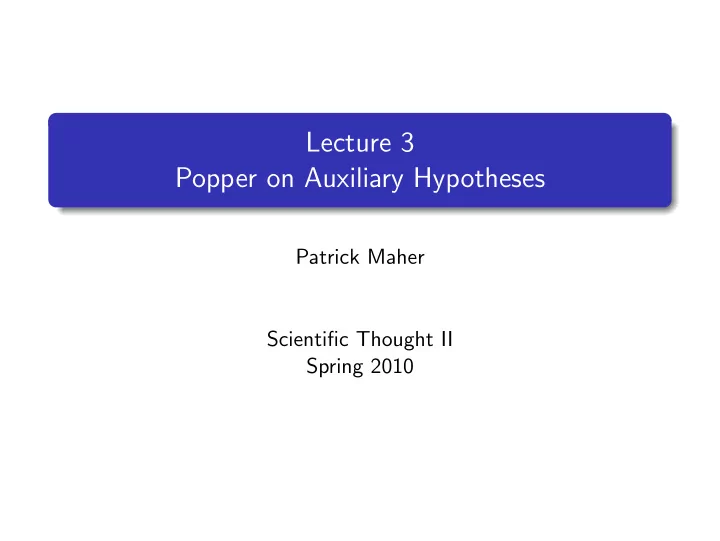

Lecture 3 Popper on Auxiliary Hypotheses Patrick Maher Scientific Thought II Spring 2010
The logic of falsification Review: Popper said Theories can’t be verified, or even made probable, but they can be falsified. Falsification is purely deductive and uses modus tollens : If T then E . Not E . Not T . Today: It’s not that simple Predictions aren’t deduced from the theory alone; other premises are also used. With the help of other statements, previously accepted, certain singular statements—which we may call ‘predictions’—are deduced from the theory. (33)
Example (by me) Let T = Newton’s law of universal gravitation: F ∝ m 1 m 2 d 2 . Suppose we want to test this by deducing observable consequences about the motion of the moon. T says that bodies have certain forces on them. We observe motions, not forces. So we need to deduce motions from the forces which T says exist. This will use Newton’s second law of motion, F = ma . We also need the distances from the moon to the earth and to the sun. These are calculated using further laws, e.g., that light travels in straight lines. The additional assumptions used to deduce a prediction are called auxiliary hypotheses .
Falsification isn’t deductive Let A = the auxiliary hypotheses. When a prediction is found to be false we have: If ( T and A ) then E . Not E . Not ( T and A ). It doesn’t follow that T is false. If we had established that A is true then it would follow that T is false. But we could only establish A by induction, which Popper doesn’t accept. So theories can’t be falsified deductively!
Popper’s methodological rule To ensure that theories can be falsified, Popper proposed this: Methodological rule A failed prediction can be blamed on an auxiliary hypothesis only if that hypothesis is replaced by a new one that leads to new testable predictions. Popper’s formulation: As regards auxiliary hypotheses we propose to lay down the rule that only those are acceptable whose introduction does not diminish the degree of falsifiability or testability of the system in question, but, on the contrary, increases it. (82–83)
True theories may be “falsified” If a prediction of a theory is found to be false, and we can’t think of a revised auxiliary hypothesis that leads to new testable predictions, then Popper’s rule says we must conclude that the theory is false. But it could be that the theory is true and the auxiliary hypotheses are responsible for the failed prediction. No conclusive disproof of a theory can ever be produced. (50)
Example A neutron can decay into a proton and electron; this is called beta decay . In the 1920s physicists found that the combined energies of the proton and electron was less than the energy of the original neutron. Some leading physicists said this falsified the principle of conservation of energy. Pauli suggested that there is an another particle being emitted which is invisible. It must be small and electrically neutral. Fermi called it the “neutrino” (Italian for “little neutral one”). There was no way to detect Pauli’s particle at the time, so Popper’s rule prohibits this way of saving conservation of energy. Neutrinos were detected in a difficult experiment done in 1956. Conservation of energy is correct.
Popper makes science pointless Theories can’t be deductively proved true because they go beyond the evidence. They can’t be deductively proved false because auxiliary hypotheses are used in deducing predictions. To infer that they are probably true or probably false would be to use induction, which Popper rejects. Therefore, Popper’s views imply that there is no justification for thinking that the theories accepted in science are true or that the ones rejected are false. We might as well use a ouija board or read tea leaves to find out about the world. My view: Instead of trying to do away with induction, as Popper does, we should try to understand it better and justify it.
Questions 1 Why can’t theories be falsified deductively? What is the methodological rule that Popper introduced to ensure that theories can be falsified? 2 Can Popper’s scientific method ever require a true theory to be regarded as false? Explain. 3 On Popper’s account of science, is there any justification for believing that the theories accepted in science are true or that the theories rejected by science are false? Explain.
Reference Karl Popper. The Logic of Scientific Discovery . Basic Books, 1959. Online at Questia. Numbers in parentheses are page numbers of this book.
Recommend
More recommend